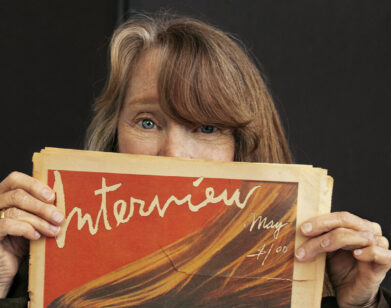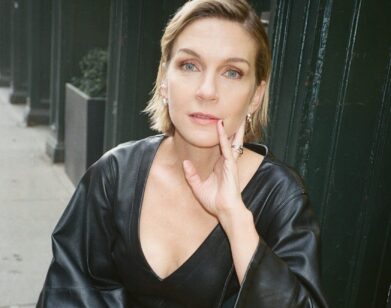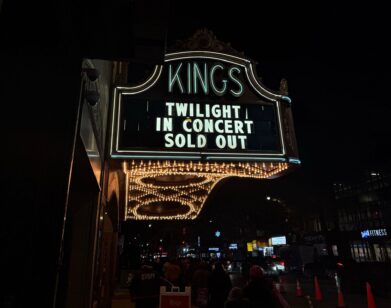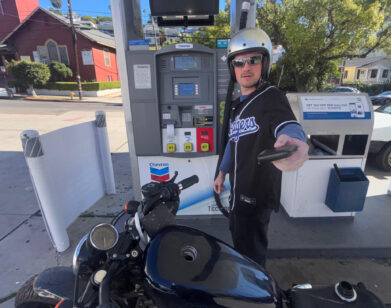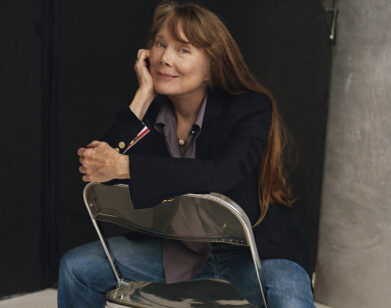Jacques Audiard’s Flesh and Blood
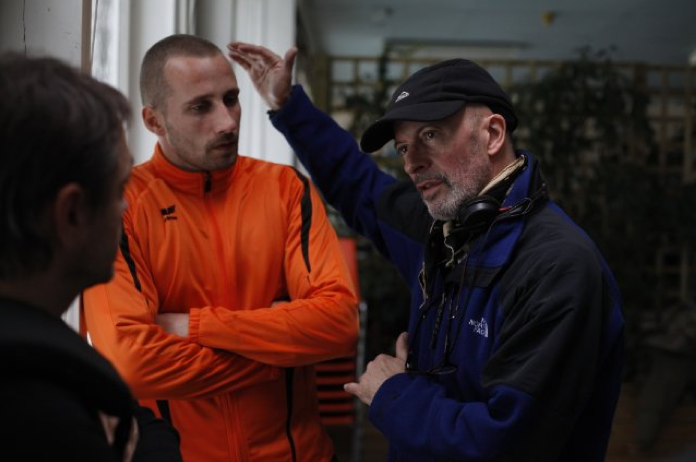
ABOVES: MATTHIAS SCHOENAERTS (LEFT) AND JACQUES AUDIARD (RIGHT) ON THE SET OF RUST AND BONE. PHOTO COURTESY OF WHY NOT PRODUCTIONS.
Jacques Audiard takes his time, and perhaps more directors should do the same. While Audiard has only released six feature films over his 18-year career as a director, every one of them is worth watching. Even in the eyes of unsentimental film critics, Audiard’s record is yet unblemished.
Rust and Bone is Audiard’s latest film and, thanks to Marion Cotillard, his most famous. According to the film’s credits, it it is based on two short stories by Canadian author Craig Davidson—“Rust and Bone” and “Rocket Ride“—but this is a little misleading. Open Davidson’s book and you’ll find that Audiard’s protagonists, orca trainer Stephanie (Cotillard) and downtrodden boxer Ali (Matthias Schoenaerts), don’t really exist. There is an orca trainer and a boxer, but they are not Stephanie and Ali; they are characters worthy of Raymond Carver or Steinbeck, and their bleakness is decidedly North American. Audiard is famous for taking a tired story—such as the struggle of a young man coming of age in prison in A Prophet (2009)—and revitalizing it with fresh, French eyes. This is exactly what he does with Davidson’s stories: both films share an overwhelming sense of desperation, but Audiard translates Davidson’s sparse narrative into something more lyrical, and perhaps less familiar. As Audiard told the Guardian, “If you open the door of a boxing gym in Brooklyn, you know what is behind it… If you open it in Antibes, it’s all new. There is curiosity.”
The filmmaker clearly loves his medium. When we speak to Audiard over the phone, he is at his most animated when he describes the questions he would ask David Lynch. If his children wanted to pursue the family business (Audiard’s father is writer-director Michel Audiard), he would first tell them: “Prove to me that you love film.” How? “By thinking about it, talking about it, writing.”
Originally conducted in French, in the interview below Interview and Audiard discuss Rust and Bone, writer’s block, Katy Perry, and Beethoven.
EMMA BROWN: How did you discover Craig Davidson’s short stories?
JACQUES AUDIARD: How did I discover them? They were translated into French and some one gave them to me as un cadeau d’anniversaire. A birthday present. [laughs]
BROWN: The form of the short story can be very powerful, sometimes more so than a longer novel.
AUDIARD: Yes, it’s possible, it’s possible—but I wouldn’t make a generalization. In this case they were short stories, and they were very visual. There was something about them that made them seem very close to the cinema. Craig has a writing style that is very visual, very cinematic.
BROWN: Do you search for stories to adapt, or do you discover them by chance ?
AUDIARD : It was really by chance. With [my scriptwriter] Thomas Bidegain, we had done a film set in a prison with men. We really craved something else. Craig Davidson’s stories—we changed the characters a lot. The character of the girl [Stephanie, played by Cotillard], in Davidson’s story it’s a man, a boy.
After A Prophet, I wanted to have a female character, to tell a love story. When I read Craig Davidson’s stories, there wasn’t one. We cobbled a love story onto [his] short stories. We took two [separate] stories and made a love story. That said, what was in the short stories were the orcas, Marine Land, boxing, the child—things like that. I wouldn’t have been able to come up with that, that was something that the stories gave us.
BROWN : Do you think that the relationship between Stephanie and Ali will last ?
AUDIARD : [laughs] I don’t know. I hope so, I hope so. It was the story of a little boy who was looking for a mother, a wife for his father. So, from that point of view, [you] hope that it works. But, why shouldn’t it ?
BROWN : Very optimistic. I like the way that you use Katy Perry’s song “Firework” when Stephanie is leading the orca show at Marine Land.
AUDIARD: That’s Marine Land’s song. That’s the song that they actually use for the orca shows. The orcas hear Katy Perry four times a day.
BROWN: It transforms the song into something very captivating—there is a classical grace to it.
AUDIARD: That’s true.
BROWN: Which is not something I would generally associate with Katy Perry, she is so deliberately ostentatious…
AUDIARD: I didn’t know about her before I watched the orca show.
BROWN: Do you listen to her music now?
AUDIARD: I don’t really have the time, and I haven’t really thought about it. I’ll pay more attention [the next time] I listen to her, that’s for sure.
BROWN: What did you do on the first day that you had Marion and Matthias together?
AUDIARD: What did I do? I don’t really remember. Matthias and Marion—I don’t remember anymore. [To Thomas Bidegain] Do you remember? No? My scriptwriter doesn’t remember either.
BROWN: I heard that you wanted to be a teacher before you decided to go into film.
AUDIARD: Oh, yes. It was a vague idea back when I had ambition. Wait. [speaks to Bidegain] Ah, Tom is right! The first scene [we shot] with Matthias and Marion was the scene in the nightclub where she faints.
BROWN: Did you want Marion and Matthias to get to know each other before they filmed that first scene? Or did you try and keep them apart so that their first meeting in the film would be more authentic?
AUDIARD: No, no. Honestly, I would have liked them to see each other a lot before we started working, but there were two things. Marion’s schedule was complicated—she was filming in the US—and my schedule was dictated by the availability of Marine Land, I could only film there at a certain time. We arranged everything around that and the result was that I didn’t get to work much with the actors beforehand. Normally, that’s what I do.
BROWN: Was Marine Land happy to be in the film? What happens to Stephanie there is rather off-putting and frightening.
AUDIARD: I don’t know. I don’t have any news. I think that the trainers were happy enough, but I don’t know about the directors.
BROWN: What’s the best advice you’ve ever gotten?
AUDIARD: In life in general ? Well, I don’t know. It’s something that I tell myself every morning when I wake up: “Think it over, take the time to think it over.” I don’t like spontaneity, there you go. I’m wary of it.
BROWN: In one of your interviews you said, “I don’t create works of art. I make films, period. One comes after another. A work of art is something carved out of marble.”
AUDIARD: Yes, exactly.
BROWN: Do you think we place too much importance on film today?
AUDIARD: That’s interesting. We give them a considerable commercial importance. It’s the major change in cinema over the past 20 years—there’s no longer a lot of room for anything other than this commercial conception [of film]. It suits me moderately, but I’m not passing judgment on it.
BROWN: Does working in France help you avoid the commercialization of cinema?
AUDIARD: I think so. I’m quite free here.
BROWN: If you could interview anyone, whom would you interview and why?
AUDIARD: [pauses] The first person that comes to mind is Francis Bacon. Or maybe David Lynch. Why? Because they really created these worlds—maybe Kubrick as well. But I’m only giving you names of filmmakers or painters, outside of that I don’t know. Maybe Beethoven: “Why the quartets?”
BROWN: What would you ask David Lynch?
AUDIARD: Firstly, “How are you?” After that I’d tell him that his films have stayed in my head—I’ve re-watched them—and I’d ask him more precise questions. I want to know, for example, if, like I think, the bag that covers up the Elephant Man comes from Disney’s Dumbo. Things like that.
BROWN: Are you working on another film now?
AUDIARD: I’m trying to, but it’s not working. [laughs]
BROWN: What do you do for inspiration when you get stuck?
AUDIARD: I read. I don’t know. When things aren’t working out, we have a tendency to say, “Go do other things,” but you shouldn’t do other things. You need to stay at your desk and continue to try to write. You need to insist on it.
RUST AND BONE COMES OUT ON LIMITED RELEASE TODAY, NOVEMBER 15. CRAIG DAVIDSON’S COLLECTION OF SHORT STORIES, RUST AND BONE, IS AVAILABLE VIA AMAZON.

